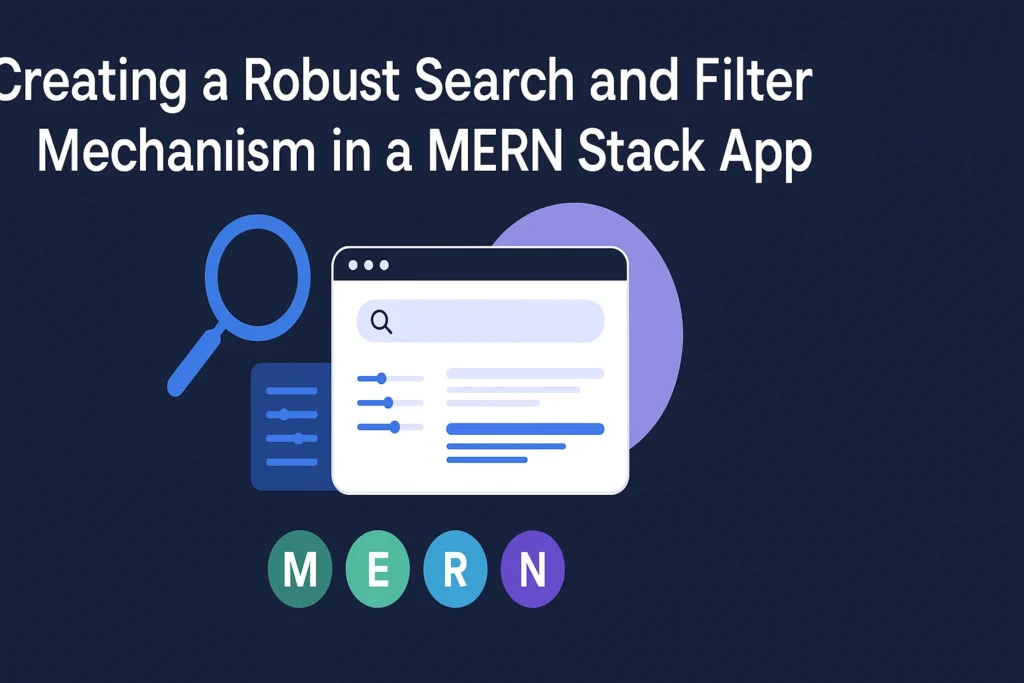In today’s digital world, search and filtering are essential features for any content-heavy web application. Whether you’re building an e-commerce platform, a blog, or a job portal — users expect to find what they need quickly and efficiently.
In this post, we’ll walk you through how to build a scalable and efficient search and filter mechanism using the MERN stack. This includes backend filtering with MongoDB, Express.js APIs, and React-based frontend filters.
🔧 Tech Stack Prerequisites
- MongoDB – Document database
- Express.js – API layer
- React – Frontend UI
- Node.js – Backend runtime
1️⃣ MongoDB Schema Design for Filtering
A well-structured MongoDB schema makes filtering easy and performant. Example:
const ProductSchema = new mongoose.Schema({
name: String,
category: String,
price: Number,
inStock: Boolean,
tags: [String],
});
Ensure fields like category, price, or tags are indexed for faster querying.
2️⃣ Building the Filter API with Express.js
Here’s a sample route with filters:
router.get('/products', async (req, res) => {
const { search, category, minPrice, maxPrice } = req.query;
let query = {};
if (search) {
query.name = { $regex: search, $options: 'i' };
}
if (category) {
query.category = category;
}
if (minPrice || maxPrice) {
query.price = {};
if (minPrice) query.price.$gte = Number(minPrice);
if (maxPrice) query.price.$lte = Number(maxPrice);
}
const products = await Product.find(query);
res.json(products);
});
3️⃣ React Frontend with Dynamic Filter Controls
Create a form with search input and dropdowns:
function ProductFilter({ onFilter }) {
const [search, setSearch] = useState('');
const [category, setCategory] = useState('');
const handleSubmit = (e) => {
e.preventDefault();
onFilter({ search, category });
};
return (
<form onSubmit={handleSubmit}>
<input type="text" placeholder="Search" value={search} onChange={e => setSearch(e.target.value)} />
<select onChange={e => setCategory(e.target.value)}>
<option value="">All</option>
<option value="electronics">Electronics</option>
<option value="books">Books</option>
</select>
<button type="submit">Apply Filters</button>
</form>
);
}
4️⃣ Connecting Frontend to Backend
const fetchProducts = async (filters) => {
const query = new URLSearchParams(filters).toString();
const res = await fetch(`/api/products?${query}`);
const data = await res.json();
setProducts(data);
};
✅ Bonus: Performance Tips
- Use indexes in MongoDB for search fields.
- Apply pagination using
limitandskip. - Use debouncing on search inputs in React.
📌 Conclusion
Building a robust search and filter system in the MERN stack isn’t hard if done thoughtfully. With optimized MongoDB queries and responsive React interfaces, you can deliver an amazing user experience that scales.
🔗 Useful Links
If you’d like, I can convert this into a downloadable Markdown or HTML blog post, or even help you publish it on your blog platform (like WordPress, Ghost, etc.). Let me know!









